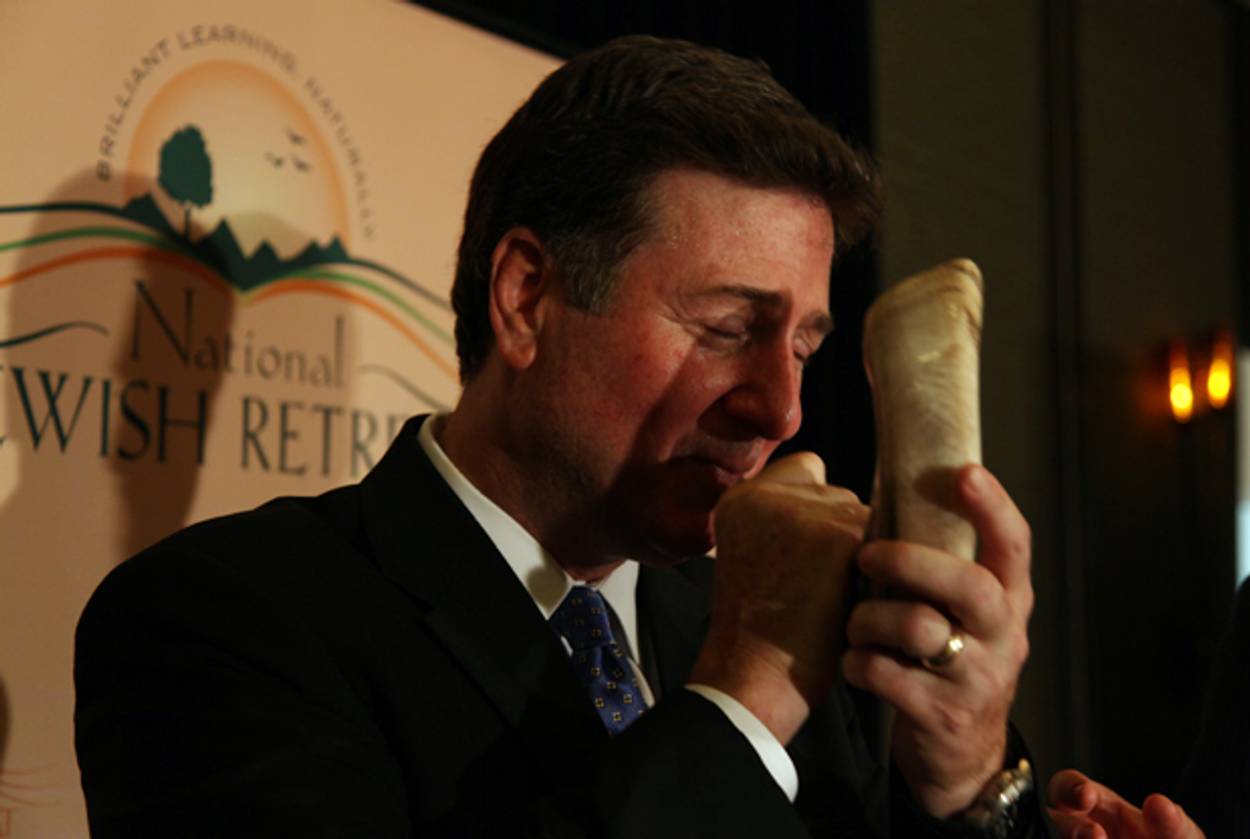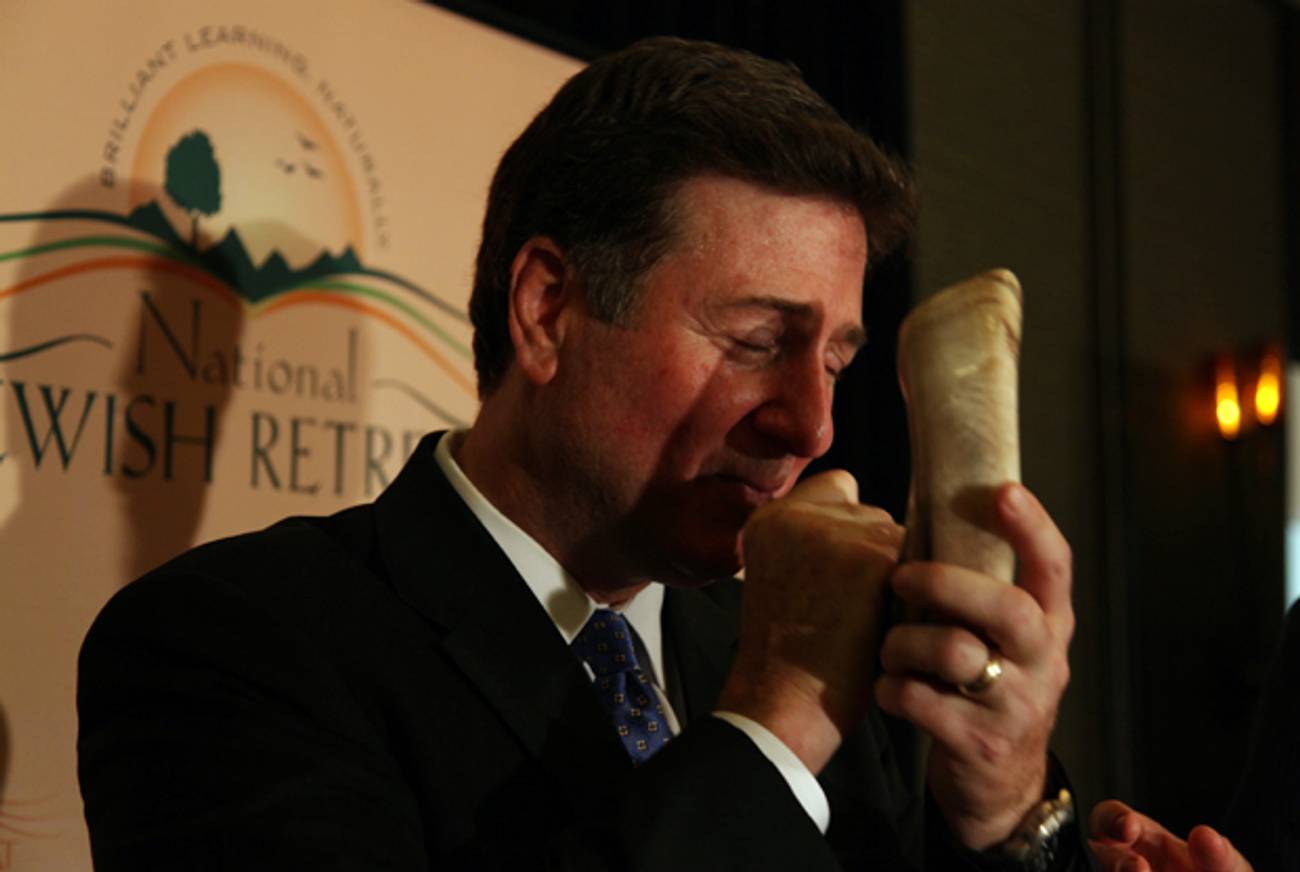George Allen, Born Again
The Republican remembered for a slur is using his Jewishness to help orchestrate his political comeback




In mid-June, a few days after winning the Republican primary for the Senate seat he lost memorably six years ago, former Virginia Gov. George Allen strode onto a stage in downtown Washington, D.C., and gave a speech about religious tolerance. “I found out in the summer of 2006 that my grandfather was Jewish, and my mother hid this all these years,” Allen, flanked on the left by an American flag and on the right by an Israeli flag, told his audience at the annual convention of the Faith and Freedom Coalition, a group started by the Christian political activist Ralph Reed. “It’s very personal when the person who brought you life and raised you has these scars and fear, so that’s why it’s important for all of us as leaders … to stand up together for religious liberty.”
It was an appearance that would have been unthinkable for the candidate in his previous incarnation. In 2006, Allen vehemently denied his family’s Jewish roots following a bombshell report about his mother’s Tunisian Jewish background by the Forward’s E.J. Kessler. The energy with which he rejected the truth added an unpleasant frisson of self-hatred to a campaign already beset by charges of racism, after Allen was captured on video using an obscure North African slur against an Indian-American political operative: “macaca.” Allen’s campaign spiraled in its final weeks, and he lost re-election by fewer than 9,000 votes, less than half a percent. Then he all but disappeared into the political wilderness, where he opened a political consulting firm and spent a few years keeping quiet about his new Jewish identity.
But Allen’s speech this past June is one of several instances during his current campaign—now locked in a tight race against Democrat Tim Kaine in one of the five most critical swing states in the country—where the Republican has relied on his personal history to explain to voters how he’s changed. It’s a strange balance for a man who still makes sure to remind audiences he was raised Presbyterian.
Once considered a potential presidential contender, Allen has plainly put effort into crafting an appealing narrative out of his earlier mortification in an attempt to pull off one of the most dramatic political comebacks of the year. Yet he has declined to cast himself as a Jewish Republican. Doing so, said Edward Lynch, a Hollins University political-science professor who recently published a history of Allen’s political career called Starting Over, would recall 2006, “and that he does not want to do, because if that is revisited, who knows what other parts of the nightmare campaign would also be revisited. It threatens to veer off into unpredictable directions, and politicians running for office do not like unpredictability.”
Allen isn’t the first politician to handle public revelations of hidden Jewish history awkwardly: Madeleine Albright, as President Clinton’s secretary of state, did a similar dance when her Czech family’s history was reported by the Washington Post in 1997, provoking widespread incredulity and an indignant broadside in the New York Times from Frank Rich, who spoke for many when he argued that someone as well-educated as Albright could only have failed to guess her Jewish background if she didn’t want to know about it. It took Albright until this year to tell the story in a memoir.
In Allen’s case, the lowest point came with his decision to publicly bully a reporter who asked him about his Jewish background, accusing her of “making aspersions,” even though Etty Allen had already told her son the truth. Allen also made a point, as the scandal wore on, of complimenting his mother’s way with pork chops and saying that he was still eating ham sandwiches. It only compounded the endless fallout from the “macaca” episode, which reignited longstanding allegations of racism, including his decision to sport a Confederate flag pin in a high-school yearbook picture and later to keep a Confederate flag on the wall of his house.
This fall, Allen has avoided talking about his fondness for trayf and has made at least one campaign appearance before a Jewish federation group in Virginia, according to his campaign staff. But in most public forays, he has neglected to mention the Jewish question, instead focusing on his core campaign issues: energy and the economy. He wrote a campaign book, What Washington Can Learn From the World of Sports, in which he went to great lengths to describe how the locker-rooms of his father, the legendary football coach George Allen, were colorblind. But the book doesn’t mention the revelations of his Jewish background; his mother’s story comes up only in the context of heralding the immigrant spirit that makes America such a great nation.
“It’s something he knows is a fact, and he’s not exactly sure what to do with it,” said Levi Shemtov, the head of Chabad’s Washington office, who met Allen at a 2010 retreat in Virginia where the candidate was given a shofar that he now displays in his office. The speech Allen gave this June was a distilled version of the half-hour talk he gave at that Chabad event—a discourse into the various ways his mother’s wartime experience as a Jewish girl in Tunis warped her own Jewish identity and in turn effectively robbed her children of theirs. The first he heard of many of his distinguished forebears, he said, was during an interview on CNN with Wolf Blitzer, who had an index card marked with the names and biographies of illustrious Lumbrosos, his mother’s family. “That 3-by-5 card, I cherished it,” Allen said in his talk.
Allen also told his Lubavitch audience, en passant, that he learned the truth in 2006 from his mother when he stayed at her home in Los Angeles, where Allen grew up, the night before a fundraiser hosted by Elliott Broidy, who was at the time a board member of the Republican Jewish Coalition. This year, members of the group’s board have been similarly generous: Sam Fox, the St. Louis-based private-equity magnate and a former RJC chairman, recently threw Allen a fundraiser. And employees of Paul Singer, the hedge-fund manager who is a major Romney backer and PAC donor, are Allen’s third-most prolific donors, according to the most recent campaign reports.
However, though Allen spoke last week before a meeting of the Republican Jewish Coalition’s national leadership, the group, which is spending millions on television ads in Florida and Ohio, has declined to get involved in Virginia on Allen’s behalf. Executive Director Matt Brooks said that decision was made in part because most of the state’s Jewish voters live in the Washington area, the state’s most expensive media market, and the outcome of the Senate race is seen as being heavily dependent on the presidential election.
There is also the unavoidable reality that, even if Allen joins House Majority Leader Eric Cantor, his fellow Virginian, as the second Jewish Republican member of Congress, his political rehabilitation will be far from complete. “He’s still on the radar screen,” said Fred Zeidman, a Houston businessman who sits on the Republican Jewish Coalition board and is active with the Romney campaign. “But, except for one word, that man would have been the Republican candidate for president of the United States.”
***
Like this article? Sign up for our Daily Digest to get Tablet Magazine’s new content in your inbox each morning.
Allison Hoffman is a senior editor at Tablet Magazine. Her Twitter feed is @allisont_dc.
Allison Hoffman is a senior editor at Tablet Magazine. Her Twitter feed is @allisont_dc.